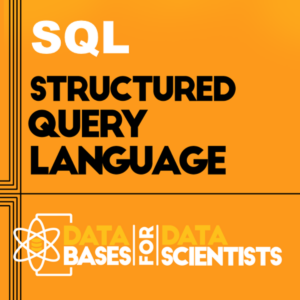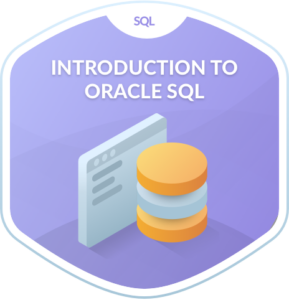Best SQL Certifications - Q2 2023
Our Expert Picks
Time to Complete:
# Enrolled:
Content Coverage:

Lecturer Quality:

Quiz Quality:

Exercise Quality:

Our Expert Review
Content Coverage (5/5)
The course is sequenced into 4 weeks, each week containing lectures, readings, exercises, and quizzes. The instructor presents concepts in a logical sequence that is easy to understand. The course focuses on the use of SQL for data analysis and doesn’t require the learner to download or install any specific software. What you learn can therefore transfer to any major database software application. While the curriculum did lack some of the more complex concepts covered in other courses, our experts felt that the coverage was more than adequate.
Lecture Quality (5/5)
The instructor for this course was knowledgeable and confident. The course is designed in a side-by-side view, with one side showing the instructor while the other side displays slides, graphics, and code to illustrate the concepts being covered.
The instructor uses conceptual graphics with animations to explain more complex concepts.
During the videos, pop-up questions or tips appear to test the learner’s knowledge of what has been covered. This breaks up the videos in an engaging way and provides an opportunity to test your knowledge.
Quiz Quality (5/5)
The course offers well-written quizzes that truly test the learner’s knowledge.
Assignment/Exercise Quality (5/5)
The course includes “sandbox” assignments that actually allow the learner to enter SQL code and see the outcome. The learner is then asked to provide their thoughts on the exercise and submit the results. This is great for practice. In fact, some of these exercises even cover syntax variations for different database systems.
Certificate Brand Quality (5/5)
The course is offered by U.C. Davis, a very well-respected university. If you decide to pay for a certificate for this course, it is likely to stand out to employers.
Time to Complete:
# Enrolled:
Content Coverage:

Lecturer Quality:

Quiz Quality:

Exercise Quality:

Our Expert Review
Content Coverage (4/5)
This is a comprehensive course with a pace similar to a college course. The topics are presented in a logical sequence that is easy to follow. The curriculum covered is missing some key topics, such as data aggregation and working with math functions, but this is still a solid introductory course.
Lecture Quality (5/5)
The instructor, a seasoned University of Michigan professor, uses slides with conceptual graphics and draws over these in real-time to emphasize certain topics. Real-world, relevant examples are used in lectures and exercises.
The course also offers “bonus office hours” in which different people who have taken the course are interviewed. There are also interviews with experts in the field, which adds some nice context.
Quiz Quality (5/5)
Quizzes are provided at regular intervals and are well-written to ensure that learners have an opportunity to reinforce what they’ve learned.
Assignment/Exercise Quality (4/5)
Assignments use real-world examples and are presented at regular intervals. Some of the assignments are reviewed by peers. The value of this feedback is dependent on the diligence of the person who reviews your submission. Feedback on the site indicates that this is not always valuable.
Certificate Brand Quality (5/5)
This course is offered by the University of Michigan, a very well-respected university. If you decide to pay for a certificate for this course, it is likely to be noticed by potential employers.
Time to Complete:
# Enrolled:
Content Coverage:

Lecturer Quality:

Quiz Quality:

Exercise Quality:

Our Expert Review
Content Coverage (5/5)
Provided by Standford University through EdX, this course is structured in 2 densely packed modules containing relatively long videos and a series of interactive exercises. The course does cover the majority of concepts that our experts have identified for an introductory SQL course.
Lecture Quality (3/5)
Lectures are delivered via a split screen in which the instructor is in the lower-right corner and the larger screen shows either simple graphics with animations or a screen shared as the instructor writes code. The instructor tends to be a bit monotone and not very engaging. The video lectures are quite long and cover many complex topics within a single sitting without providing reviews or exercises between topics.
Quiz Quality (5/5)
The interactive exercises act as quizzes in this course, as they are self-graded.
Assignment/Exercise Quality (5/5)
One of the best features of this course are well-written exercises that allow the learner to practice and apply specific SQL queries. The queries are evaluated automatically online and the learner is given a correct or incorrect based on the results. The learner can take these exercises as many times as they’d like to get the correct answer. This is an excellent learning tool.
Certificate Brand Quality (5/5)
Stanford is a very well-known and respected brand amongst colleges and within the Computer Sciences. For this reason, this certificate is likely to stand out to employers more than other certificates.
Time to Complete:
# Enrolled:
Content Coverage:

Lecturer Quality:

Quiz Quality:

Exercise Quality:

Our Expert Review
Content Coverage (5/5)
This online course by the University of Colorado through Coursera is structured very similarly to a traditional college course – with lectures, readings, PowerPoints, quizzes, and exercises. The course is structured into 8 weeks/modules, each of which contains lectures with downloadable PowerPoint slides, several quizzes, and, in some modules, practical assignments. The concepts are presented in a logical flow that allows the learner to build their knowledge toward more and more complex topics. This course contains the majority of concepts that we consider to be important in a basic SQL course as well as some additional topics, such as Data Modeling and Entity Relationship Diagramming.
Lecture Quality (3.5/5)
The instructor tends to be a bit academic in his presentation of concepts and some of the slides are simply bulleted text, which can be a bit boring. Given that this course is significantly longer than some others on our list, learners are likely to spend a lot of time watching these relatively boring videos. One nice feature is that the lectures have periodic quizzes that pop up to check the learner’s understanding of concepts covered to that point in the video.
Quiz Quality (5/5)
Quizzes and exercises are included in each week/module, which allow the learner to test their knowledge and practice the concepts taught.
Assignment/Exercise Quality (5/5)
Quizzes and exercises are included in each week/module, which allow the learner to test their knowledge and practice the concepts taught.
Certificate Brand Quality (4/5)
The University of Colorado is a well-known university system, so the certification is likely to impress employers.
Time to Complete:
# Enrolled:
Content Coverage:

Lecturer Quality:

Quiz Quality:

Exercise Quality:

Our Expert Review
Content Coverage (5/5)
This course is broken up into four weeks. The first three weeks are comprised of a series of video lectures, ending in a quiz (the quiz is only available in the paid version). The final week is mainly a series of assignments, which are graded by peers (others taking the course). Each of the lessons uses a real-world scenario, which helps learners understand how the concept may be applied to solve actual problems. The sequence of the lessons are well thought-out and help the learner build concepts in a logical order. The syllabus for this course is quite comprehensive, covering many more complex concepts than most beginner courses.
Lecture Quality (5/5)
The instructor for this course is very polished and the video lectures are a bit more professional than some of the other courses on our list. The instructor uses screen-sharing software while demonstrating SQL coding, and does a nice job of highlighting or circling certain aspects of his code to illustrate important concepts.
Quiz Quality (5/5)
The course offers quizzes after every module, which allow the learner to test their knowledge of concepts learned.
Assignment/Exercise Quality (2.5/5)
Several peer-reviewed assignments are offered, though these are not as regular as the quizzes. The value of this feedback is dependent on the diligence of the person who reviews your submission. Feedback on the site indicates that this is not always valuable.
Certificate Brand Quality (4)
The course is by Davidson College, which is highly ranked and well-known. If you choose to pay for the certificate, it will likely stand out to employers because of this affiliation.
Time to Complete:
# Enrolled:
Content Coverage:

Lecturer Quality:

Quiz Quality:

Exercise Quality:

Our Expert Review
Content Coverage (4/5)
This course does a good job of covering both the theoretical and practical aspects of SQL with Oracle. It is organized into four modules, each containing video lectures, interactive exercises, and quizzes. The content coverage is adequate for a beginner’s course, but not as thorough as some of the others on this list.
Lecture Quality (5/5)
The co-instructors for this course are both very knowledgeable and the video lectures are well-produced. The lectures consist of voice-overs from the instructor with graphics, animations, and screen-shares illustrating the concepts.
Quiz Quality (2/5)
There are a few, sporadic quizzes with few questions throughout the course.
Assignment/Exercise Quality (5/5)
The real stand-out for this course are the interactive exercises that are interspersed frequently throughout the lessons. They are web-based, so don’t require any software installations. The frequency of the exercises allows the learner to practice and apply what they’ve learned before moving on to the next step.
Certificate Brand Quality (3/5)
Datacamp is a relatively well-known platform, but this course is not underwritten by a major university or corporation, so the certificate may not have as much of an impact on employers as other courses on our list.
Time to Complete:
# Enrolled:
Content Coverage:

Lecturer Quality:

Quiz Quality:

Exercise Quality:

Our Expert Review
Content Coverage (5/5)
This course is comprised of 17 sections, each containing short, focused videos and text-based exercises. The scope of the course is extremely thorough and the topics are covered in a sequence that allows learners to gradually build their knowledge. This is an excellent course for beginners to SQL who want to focus on SQL Server as their RDBMS.
Lecture Quality (5/5)
The video lectures for this course consist of screen shares of the instructor illustrating different ways to code SQL statements and the resulting outputs. The instructor provides voice-over as they code. Where appropriate, the instructor highlights parts of the queries or data to bring certain concepts to focus. Each lesson is well thought out, often using real-world data and examples to help illustrate the concept. The instructor is knowledgeable and confident, and the topics are written in easy-to-understand language.
Quiz Quality (1/5)
There are no quizzes offered for this course
Assignment/Exercise Quality (4.5/5)
Each module contains exercises “labs: that either ask open ended problems or ask the student to perform certain actions. Each exercise comes with a separate answer sheet that contains answers to specific questions or queries that can be used to complete an task from the exercise. There is also an entire module at the end of the course with exercises for learners to test their skills. These exercises are well constructed, but the learner is not required to complete them, nor do they receive any feedback from the instructor.
Certificate Brand Quality (3/5)
This course is offered through Udemy, which is a well-known and respected online learning platform. However, the course is not underwritten by any major university or corporation. As a result, the certificate may not make a strong impression on employers.
Topics To Look For in a SQL Course
- Installing database software (if applicable)
- Understanding the graphical user interface of the database software (if applicable)
- Understanding basic relational database design (relational integrity, data autonomy, low redundancy)
- Creating databases and understanding data types
- Primary, Foreign Keys, Null values, Unique constraint
- Select, Update, and Delete statements
- Filtering criteria (Where, Having, >, <, <>, =, Like, Is null, Not Null, In, Not In, Between)
- Using aliases
- Using subqueries
- Joining tables (Left, Right, Inner, Outer)
- Unions
- Aggregate functions (Sum, Avg, Min, Max, Count, Order By, Group By)
- Working with strings
A Note About Relational Database Management Systems (RDBMS)
The Major Online Learning Platforms
Each online learning platform is unique. Some specialize in certain types of content, some partner with major universities or corporations to develop content, and some have special learning features. While not exhaustive, the list below includes the major online platforms whose courses we feature.
Pros / Cons
Pros: Certificates often are offered from major universities or corporations.
Cons: The quality of course content and features available varies dramatically between courses.
Cost
$$$
Pros / Cons
Pros: Courses are very similar to those offered in colleges.
Cons: The quality of content and features offered varies dramatically between learning programs.
Cost
$$$$
Pros / Cons
Pros: A focus on microlearning with consistently high-quality content. Consistent use of quizzes throughout all courses.
Cons: Pricing is skewed toward annual subscriptions, which is far more content (and cost) than most learners need within a year.
Cost
$$$
Pros / Cons
Pros: Labs offer a means of gaining practical experience in technical skills.
Cons: There are no incremental quizzes or ways to test learners on specific topics.
Cost
$$$$
Pros / Cons
Pros: Udemy tends to be one of the more affordable options for individuals looking to learn specific technical skills.
Cons: Highly inconsistent quality between courses.
Cost
$
Pros / Cons
Pros: Consistent, high-quality micro-content that focuses on practical exercises.
Cons: The catalog is somewhat limited compared to other vendors on this list.
Cost
$$$
Pros / Cons
Pros: Many free online classes are offered. Live online classroom experiences are offered for some of their courses.
Cons: Variable quality of courses, with some courses having relatively low quality.
Cost
$$$$$
Pros / Cons
Pros: Skillshare has a large library of courses related to creative skills.
Cons: Most courses are just a series of lectures with no interactivity, quizzing, or opportunities to practice concepts.
Cost
$$$
For more information, check out our detailed post on the best online course platforms.
Frequently Asked Questions about SQL
Can SQL create web apps?
SQL is a very important part of most web apps. It is the language used to retrieve and update data from a database. Most modern web applications have three layers:
- The User Interface – the web pages that users interact with.
- The Business Logic Tier – this tier captures requests from the User Interface, and manipulates data based on the requirements of the application. The business tier often requests or updates information from or to the database as part of its work.
- The Database – where data is stored.
Which SQL database should you use?
There is no one answer to this question. The major SQL databases include Oracle, Microsoft SQL Server, MySQL, and PostgreSQL. Each has unique features, scaling capabilities, technical requirements, and pricing. MySQL and PostgreSQL are both open source databases, so can be well suited to smaller budgets and early-stage applications. Oracle and Microsoft SQL Server are proprietary applications that provide greater levels of support and – in many cases – better scalability. They are, however, more expensive to license. When making a decision for RDBMS, you should consider what your current needs are and what they might be in 5 years. If you think that you may change databases in the future, be careful not to use the unique features of any given database.
What is the difference between SQL and NoSQL?
NoSQL databases usually store hierarchical documents (usually in JSON format). These documents can be unstructured and can follow schemas that are dramatically different from other documents. NoSQL databases use a variety of querying languages.
Are SQL and MySQL the Same?
No – SQL is a relatively common language used across all relational database management systems (RDBMS). MySQL is the brand name of one of the most popular RDBMS’.
You May Also Be Interested in These Resources
- What is SQL?
- How Long Does it Take to Learn SQL?
- Best SQL Courses for Beginners
- Best Data Analytics Courses
- Best Data Analytics Certifications
- Best Business Statistics Courses






